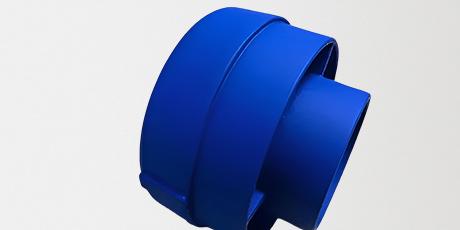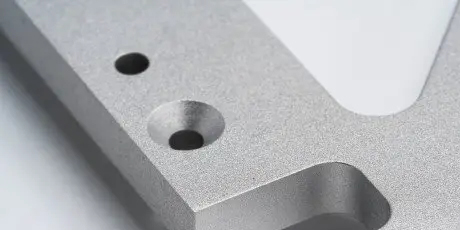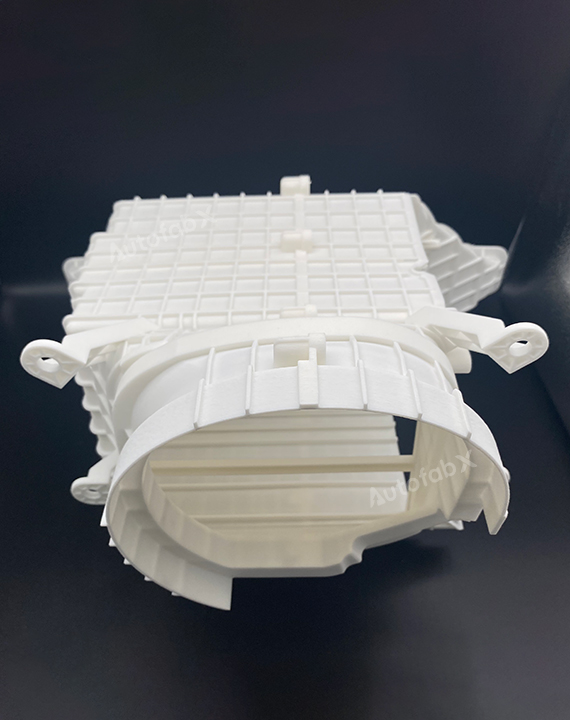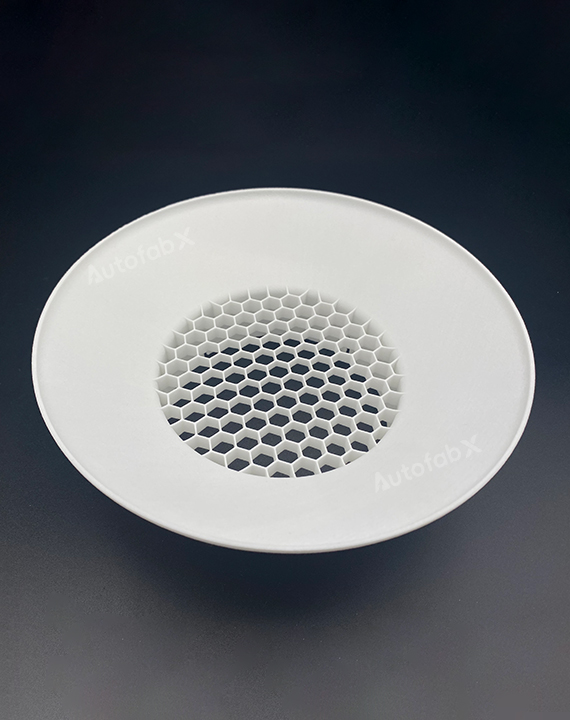
Quick Look
| Density(g/cm³) | Tensile Strength | Young's Modulus | Elongation at Break | Heat Deflection Temperature |
|---|---|---|---|---|
| 1.1 | 45MPa | 1600MPa | 38% | 85℃ |
About the Material
Advantages:
High Strength and Durability: White Nylon 12 provides good tensile strength and impact resistance, making it suitable for functional parts.
Complex Geometries: SLS technology allows for the production of complex geometries and internal features without the need for support structures.
Chemical Resistance: White Nylon 12 is resistant to a wide range of chemicals, making it suitable for industrial applications.
Consistent Mechanical Properties: SLS ensures consistent mechanical properties throughout the part, providing reliability in functional use.
Limitations:
Surface Porosity: Parts may have a slightly porous surface, which may require additional finishing for certain applications.
Limited Heat Resistance: White Nylon 12 has moderate heat resistance, which may limit its use in high-temperature environments.
Post-Processing Requirements: Parts may require bead blasting or other post-processing to achieve the desired surface finish.
Chemical Composition Table for White Nylon 12
| Component | Composition |
| Nylon 12 | 100% |
| Additives (Colorants) | None |
Mechanical Machining Properties Table for White Nylon 12
| Property | Value |
| Machinability Rating | Moderate |
| Cutting Speed (m/min) | 15-25 |
| Tool Wear Resistance | Moderate |
| Coolant Requirement | Optional |
| Surface Finish Quality | Moderate |
Design Parameters Table for SLS Printing with White Nylon 12
| Maximum Bulid Size(mm) | Minimum Wall Thickness | Minimum Drill Size | Minimum Assembly Gap | Tolerance |
| 380*380*420 | 0.8mm | 1mm | 0.2mm | ±0.3% *Length(lower limit of ±0.2 mm) |
Industry Applications and Case Studies for SLS Printing with White Nylon 12
Automotive Industry:
Application: Production of functional prototypes and lightweight components.
Case Study: An automotive manufacturer used White Nylon 12 to produce air intake components, leveraging the material's strength and chemical resistance.
Consumer Goods:
Application: Manufacturing of durable consumer products and accessories.
Case Study: A consumer goods company used SLS with White Nylon 12 to produce wearable accessories, benefiting from the material's flexibility and durability.
Industrial Equipment:
Application: Production of jigs, fixtures, and tooling components.
Case Study: A manufacturing company used White Nylon 12 to create custom tooling, ensuring high durability and precision for assembly processes.
Frequently Asked Questions (FAQs) about SLS Printing with White Nylon 12
What are the benefits of using White Nylon 12 in 3D printing?
White Nylon 12 offers high strength, flexibility, and chemical resistance, making it ideal for functional prototypes and end-use parts.
Is White Nylon 12 suitable for functional parts?
Yes, White Nylon 12 is suitable for functional parts that require impact resistance, toughness, and chemical durability.
What industries benefit from SLS printing with White Nylon 12?
Industries such as automotive, consumer goods, and industrial manufacturing benefit from the versatility and strength of White Nylon 12.
How accurate is SLS printing with White Nylon 12?
SLS printing with White Nylon 12 can achieve tolerances of ±0.3 mm, suitable for most functional applications.
What post-processing is required for White Nylon 12-printed parts?
Post-processing may include bead blasting, polishing, or dyeing to improve the surface finish and appearance.
Can White Nylon 12 be used in high-temperature environments?
White Nylon 12 has a heat deflection temperature of 95°C, making it suitable for moderate-temperature applications but not for high-heat environments.
How strong are White Nylon 12-printed parts?
White Nylon 12-printed parts are strong and durable, with good impact resistance, making them suitable for functional applications.
Finishing Options








Parts Made by AutofabX

